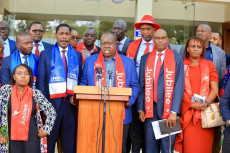- President Uhuru Kenyatta jump-started the culture of a swelling presidential advisory team. In just 18 months of his first term, he had already appointed 20 advisors across various dockets within his government.
- President Ruto has followed suit and currently boasts a team of 20 advisors, with some serving at the Cabinet Secretary (CS) and Principal Secretary (PS) levels.
The notion of advisors to the President is not short-lived, as its history dates back to Mzee Jomo’s government. The veracity of this lede lies in the fact that President Kibaki only formalized the exercise so that these individuals would be paid from public coffers, but they were there long before.
For instance, Jomo Kenyatta’s regime saw the input of political figures like the late Mbiyu Koinange, Njoroge Mungai, and then-Attorney General Charles Njonjo. Mzee Moi’s time had powerful forces such as former Cabinet minister Nicholas Biwott. Before the ratification, Kibaki had the likes of the late John Michuki and the late Njenga Karume.
President Uhuru Kenyatta jump-started the culture of a swelling presidential advisory team. In just 18 months of his first term, he had already appointed 20 advisors across various dockets within his government. President Ruto has followed suit and currently boasts a team of 20 advisors, with some serving at the Cabinet Secretary (CS) and Principal Secretary (PS) levels.
Their roles?
Advisors to the President usually hold private briefings, and it may not be easy to judge whether they add value to an administration. It is, therefore, perfectly in order for President Ruto to have advisors outside the Cabinet for confidential and credible briefings on crucial matters.
Read More
In this regard, ministries are broad-based. The President needs some people to sensitize and synchronize information so that he can understand it and make up his mind in the country's interest. Such roles cannot clash with the role of cabinet secretaries in any way, hence the need for advisors outside of the Cabinet.
However, the Constitution of Kenya also stipulates that the President's advisors are primarily the Deputy President (DP), Cabinet Secretaries (CSs), and the Attorney General –the Cabinet. The President may also utilize the advice of other individuals, such as Principal Secretaries (PSs) and other public officers, as deemed necessary.
Having advisors is the right call. For instance, U.S. President Donald Trump has Senior Advisors like Elon Musk (Government Efficiency), Massad Boulos (Arab, Middle Eastern, and Africa Affairs), and Boris Epshtyen (Communications).
What downplays President Ruto’s advisory team is the swelling nature which exerts more pressure on the already dented taxpayers, his criteria of appointments since some have been dismissed from CS and PS positions, and their effectiveness since the sectors they represent are already in muddles.
Moreover, when forming the government, President Ruto promised to reduce the number of presidential advisers as part of his austerity measures. The situation today paints a grim picture of his capability to fulfil promises.

-1746675471.png)






